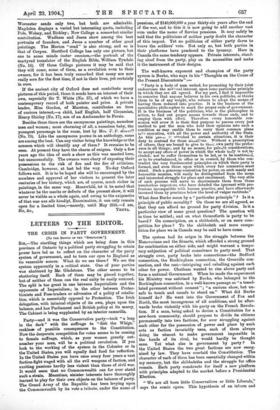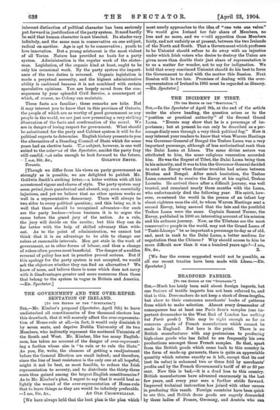" We are all born little Conservatives or little Liberals,"
says the comic opera. This hypothesis of an inborn and inherent distinction of political character has been seriously put forward in justification of the party system. It need hardly be said that human character is not bisected. Its shades vary infinitely, and the same man is conservative on one subject, radical on another. Age is apt to be conservative ; youth to love innovation. But a young aristocrat is the most violent of all Tories. Nature has provided no basis for a party system. Administration is the regular work of the states- man. Legislation, of the organic kind at least, ought to be only his occasional work. By the party system the import- ance of the two duties is reversed. Organic legislation is made a perpetual necessity, and the highest administrative ability is cashiered because it is not combined with certain speculative opinions. You are largely saved from the con- sequences by your splendid Civil Service, a counterpart of which, of course, no Colony can maintain.
These facts are familiar; these remarks are trite. But it may interest you to know that in this province of Ontario, the people of which are as worthy of good government as any people in the world, we are just now presenting a very striking illustration of the facts and confirmation of the moral. We are in danger of losing respect for government. What should be substituted for the party and Cabinet system it will be for political experts to determine. English history presents to you the alternative of a Standing Council of State which for some years had an elective basis-.T'latt subject, however, is one well suited to the colula-ati of the Spectator, amidst the party fray still candid...aaci calm enough to look forward to the future.
- -I am, Sir, &c., GOLDWIN SMITH. Toronto.
THE INCIDENT IN TIBET.
pro THE EDITOR Or TR. SPROTATOR.”1 THE GOVERNMENT AND THE OVER-REPRE- SENTATION OF IRELAND.
ITO TDB EDITOR Of TOR SPECTATOR-1
Kimber's proposal (Spectator, April 9th) to leave undisturbed all constituencies of five thousand electors has this drawback, that it will scarcely affect the over-representa- tion of Home-rule at all,—in fact, it would only diminish it by seven seats, and deprive Dublin University of its two Members, who indirectly represent the scattered Unionists of the South and West. Mr. /limber, like too many English- men, has taken no account of the danger of over-represent- ing a faction whose aim is "to ruin or to rule the State." As you, Sir, write, the chances of getting a readjustment before the General Election are small indeed; and therefore, since the line of least resistance is the only one at all hopeful, might it not be beat, as most feasible, to reduce the Irish representation to seventy, and to distribute the thirty-three seats thus gained among the largest English constituencies ? As to Mr. Iiimberat plan, I regret to say that it would heal so lightly the wound of the over-representation of Home-rule that to leave things as they are would be infinitely posferable.
—I am, Sir, &c., AN OLD CROMWELLIAN.
[We have always held that the beet plan is the plan which Sir, &c., Z.
[We fear the course suggested would not be possible, as all our recent treaties have been made with Lhasa.—ED. Spectator.] BRADFORD FABRICS.
[TO TER EDITOR OD TRW"SPECTATOR."] Sin,—Much has lately been said about foreign imports, but one feature of textile imports has not been referred to, and that is this. Dressmakers do not keep a stock of dress-lengths, but show to their customers merchants' books of patterns from which to make selection. Almost army dressmaker of consequence has at least one Paris firm's samples (one im- portant dressmaker in the West End of London has nothing but Paris goods I) This may be right enough so far as concerns goods of French manufacture which cannot be made in England. But here is the point. There is no British manufacturer with any pretensions to producing high-class goods who has failed to see frequently 'his own productions amongst those French samples. So that, apart from the British goods which come back to this country in the form of made-up garments, there is quite an appreciable quantity which returns exactly as it left, except that its cost (not its value) is enhanced two or three fold by merchants' profits and by the French Government's tariff of 40 or 50 per cent. Now this is bad,—it is a dead loss to this country. British manufactures have advanced enormously in the last few years, and every year sees a 'further stride forward. Improved technical instruction has joined with other causes in producing this result. Foreign' countries have been quick to see this, and British dress goods are eagerly demanded by those ladies of France, Germany, and Austria who can











































 Previous page
Previous page